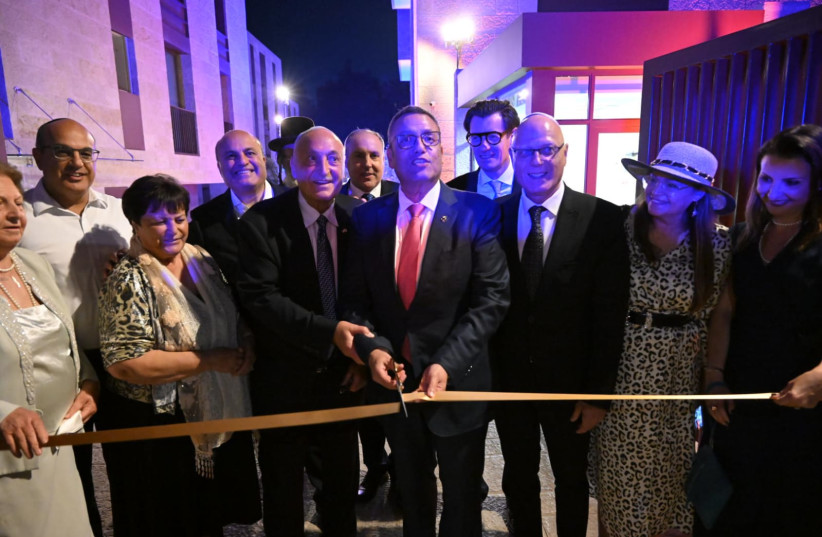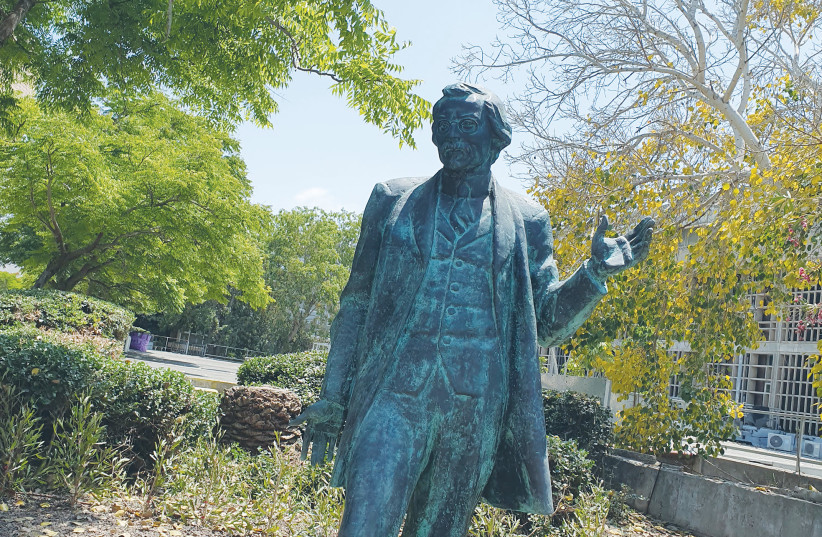It’s been a month of celebrations for the Hasid family of Jerusalem – two weddings and the official opening of their first hotel – the Theatron. A closely knit family that came to Israel from Iran some 60 years ago, theirs is literally a rags-to-riches story built on faith and determination. They came as a tri-generation family of 13 and camped for three days at what was then Lod airport. There was no available housing in Jerusalem and the Jewish Agency wanted to send them to places elsewhere in the country. But they refused. They were determined to live in Jerusalem. Eventually, they were told that there was an apartment complex under construction in the Kiryat Hayovel neighborhood, but it would not be ready for six months. “No problem,” said a relative already living in Jerusalem.
He invited the Hasids to come and live with him, his wife and their seven children in a 75 sq.m. apartment. “They were the happiest days of our lives,” recalled Zion Hasid, the 83-year-old patriarch of the family amid an assenting chorus of ululations. “We had nothing other than each other – but we were united,” said Hasid. As a young man, who needed a job to help support his family, he heeded the words of his father who said their task was to help enhance the beauty of Jerusalem.
Although he knew nothing about the construction industry, the young Zion went to see the head of the capital’s leading construction company and offered to work for nothing in order to learn the trade. He learned so quickly and did his work so well that after a short period, his boss decided to pay him and give him a set of tools. He was officially an apprentice. Since then, the Hassid family has developed a reputation for building high-class luxury apartments.
Jerusalem Mayor Moshe Lion noted that this was a historic occasion because it was the first hotel in the Talbiyeh neighborhood, and the company’s first hotel, out of four others that were already on the way. Jonathan Shebson, the representative of the owners mentioned the adjacent residential complex that had been built alongside the hotel, and Sheldon Ritz, who is general-manager of both, was delighted to see many friends and people who had been clients at hotels where he had worked previously, among the 500 guests who toured the premises and ate from the sumptuous buffet.
Among them were Gil Haskel, chief of State Protocol; Sam Grundwerg, world chairman of Keren Hayesod; Fleur Hassan-Nahoum, deputy mayor of Jerusalem; Lasha Zhvania, ambassador of Georgia; Laurence Weinbaum, executive director of the Israel Council on Foreign Relations; and many more.

UK ambassador to Israel finishes his term
■ SHORTLY BEFORE winding up his term as UK ambassador to Israel, Neil Wigan this week dropped into the office of The Jerusalem Post to meet with members of the editorial staff. Wigan, whose next posting is to Kenya, is one of several ambassadors who have been doing their farewell rounds. The ambassador of Peru has already left, but amongst the others who will soon be waving adieu are the ambassadors of the United States, Norway, Finland, Lithuania, Denmark, Hungary, Ireland, France, Bulgaria, Cyprus, the Czech Republic, and Albania.
While it’s sad that they are leaving Israel, it’s even sadder that they are leaving each other. Members of the diplomatic community attend so many events together in any given week that they are almost like family, and form very close friendships. Suddenly all that dissipates, especially if they are not going to another posting, but are going home either to work in a branch of the Foreign Office, to leave the foreign service for a new career, or to retire. Wigan has been succeeded by Simon Walters, who Wigan said has been studying Hebrew for a year and speaks it fluently.
Walters is due to arrive in Israel next month but formally takes up his appointment in August. He is no stranger to Israel having previously served as British Consul in Jerusalem from 2008-2011. Before that, he had served in Saudi Arabia, Iraq and Yemen, prior to which he had taken an intensive year-long course in Arabic.

Remembering the Yiddish literature great, Sholem Aleichem
■ IT’S DOUBTFUL that anyone outside the world of Yiddish literature has ever heard of Solomon Naumovich Rabinovich, but even non-Jews have heard of Sholem Aleichem, which was Rabinovich’s pen name.
Every now and again there is a big revival of Yiddish. Young people who feel they have missed out on part of their heritage, attend Yiddish classes in various parts of the world, as far removed from each other as Lithuania, Israel and Australia, plus many others. In Israel, in addition to Sholem Aleichem House in Tel Aviv, Yiddish is taught at a number of institutes of higher education and on an informal basis through Yiddishpiel Theater and Yung Yidish.
One of the institutes of higher education that includes Yiddish classes in its curriculum is Tel Aviv University, which earlier this month became the on-campus repository of a bronze, life-size statue of Sholem Aleichem created by sculptor Yury Chernov. Located close to the ANU Museum, it is an all-weather reminder of how much joy and laughter Sholem Aleichem brought not just to thousands of people, but literally to millions across the decades. Fiddler on the Roof is based on his story about his character Tevya the Dairyman. “This is the beginning of a new era,” said Daniel Galay, the chairman of Leyvik House, the Association of Yiddish Writers and Journalists in Israel.
The commissioning of the statue and its placement was the brainchild of Dr. Mark Zilberquit: a Moscow-based author publisher and founder of the Yiddish Heritage Preservation Foundation, whose goal is to preserve Yiddish language and culture which was the common denominator of the majority of European Jews before the Holocaust.
This foundation was among the donors to the project, as was the Blavatnik family whose foundation engages in international philanthropy – mostly in education and culture – and is well known for its sterling support of London’s Tate Gallery.
In New York, it also founded the Blavatnik Archives which are dedicated to the study of 20th-century Jewish and world history with special emphasis on the World Wars I and II and Soviet Russia.
The Yiddish Heritage and Preservation Foundation has a strong connection with Tel Aviv University and provides scholarships for students studying various aspects of Yiddish culture.
The statue of Sholem Aleichem is part of a pilot project. If all goes well, it may become the nucleus of a Yiddish literature sculpture garden, with statues of figures such as Isaac Bashevis Singer, I.L. Peretz, Avraham Sutzkever, Sholem Asch, Itzik Manger, Kadia Molodowska, Avraham Goldfaden, Esther Kreitman and others.
Veteran Jerusalem reporter publishes book on the Israelis of today
■ AROUND SIX or seven years ago Knopf Publishing was looking for someone to write a book explaining who the Israelis are today. Someone suggested veteran Jerusalem-based New York Times correspondent Isabel Kershner. She wrote a proposal which was accepted, and a contract was drawn up. According to the contract, she had 18 months in which to complete the project. But given the constantly changing situations in this part of the world, work got in the way, and the project was put on hold. Although she felt guilty about this, there wasn’t much she could do about it until the advent of the Corona pandemic, when NYT activity in Israel and the disputed territories calmed down, and she was able to take three months’ leave of absence to focus on the book. During those three months, she completed the first draft. It was accepted, and the editing was completed some time in 2022. Finally, in the spring of 2023, the book The Land of Hope and Fear: Israel’s Battle for its Inner Soul was published.
Last week, it was officially launched at the Jerusalem Press Club, but the only visible copy was one that was Kershner’s own.
The first batch that had been sent to the Adraba Bookstore in the capital, was quickly sold out, and more books have been ordered but have not yet arrived. The other option is to purchase via Amazon.
Interviewed by JPC CEO Talia Dekel, Kershner said that in collecting material for the book, she had met a lot of fascinating people, many of whom she had interviewed at random. In her desire to present as wide-ranging a profile as possible of Israel, Kershner came across pockets of Israel of which she had previously been unaware.
Although she had much more leeway as the author of a book than she has as a journalist, she employed the same cardinal rule in her book as that which guides her in journalism. She made every effort to be fair, whether or not she agreed with what was being imparted to her.
Her most meaningful and memorable meeting was with poet, novelist, journalist and documentary filmmaker Haim Gouri shortly before his death at the age of 94. Her initial intention had been to interview him about the era of the Palmach, but Gouri, knowing his end was near, spent hours talking to her about many subjects. It was as if he had entrusted the legacy of his personal history and his opinions to her to ensure their continuity.
Kershner spoke to various ethnic groups and to members of the founding generation of the state. In the course of her research, she learned that kibbutzniks and moshavniks are no longer considered Israel’s elite and that many of them are worried about where the country is going.
She also learned that Ethiopian youth born in Israel have been the victims of blatant racism, that Israeli Arab youth were more like their Jewish contemporaries than like Palestinians and were better educated but without a horizon.
But what impressed her most was that despite the divisiveness in the country, there is vitality. Everyone is engaged. Everyone cares.
greerfc@gmail.com
